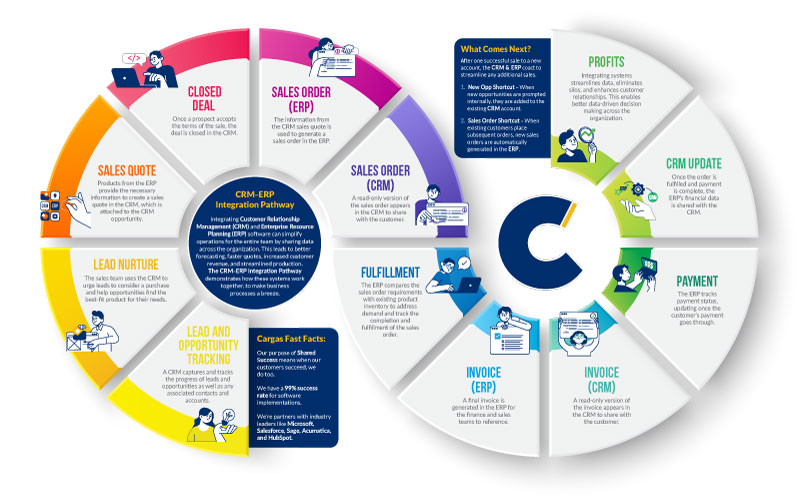
ERP vs. CRM: Which Solution Does My Business Need?
It may be easy to see that your company could benefit from a system that streamlines processes. But knowing which type of system—ERP vs. CRM—may not be crystal clear. To some level, ERP and CRM software address similar challenges. But each has distinct strengths in certain areas. Whether your business will benefit most from ERP or CRM depends on a variety of factors.
Let’s walk through the basics of each solution and then address how to decide which one might be the right fit for your company.
ERP vs. CRM: What’s the Difference?
ERP (Enterprise Resource Planning) software is designed to handle a business’s operations. Cloud-based ERP software provides a centralized database so a business’s many departments and locations can access up-to-date information in real time from anywhere, anytime.
ERP solutions, like Microsoft Dynamics 365 Business Central, manage a variety of systems and processes such as:
- Accounting
- Inventory & Operations
- Human Resources & Payroll
- Workflow Automation
- Reporting & Dashboards
The primary advantages of an ERP solution are that it gives a company’s separate business units a way to operate cohesively, work more productively, identify issues more quickly, and make improvements proactively.
Standard features in ERP software include:
- Tracking and managing orders, inventory levels, and vendor information
- Managing invoicing, general ledger, accounts receivable, accounts payable, fixed assets, and revenue recognition
- Consolidating multiple entities and multiple currencies
- Streamlining management of payroll and administration of employee benefits
- Tracking professional development
- Managing talent recruitment
- Running performance analytics
CRM (Customer Relationship Management) software is built to manage sales, marketing, and customer service processes. Cloud-based CRM software provides a centralized database for all prospective and existing customer data. It enables sales, marketing, and customer service teams to view and update information in real time from anywhere.
Standard features in CRM solutions include:
- Tracking sales leads and customer interactions
- Tracking customer issues or complaints
- Maintaining and managing customer records
- Managing the sales pipeline and sales forecasts
- Automating routine tasks
- Setting up and accessing reports
- Basic marketing automation
The primary advantages of CRM software, like Microsoft Dynamics 365 CRM, include more control over managing the customer experience and access to up-to-the-minute customer data. CRM solutions enable sales, marketing, and customer service teams to coordinate their efforts and seize opportunities to gain new customers and keep existing customers satisfied.

Do You Need ERP or CRM Software for Your Business?
Both ERP and CRM solutions touch multiple facets of a business. And for more extensive capabilities, both can be integrated (or linked) to other systems that a company uses.
Depending on the focus of your business, you may need either an ERP or CRM solution. If you can benefit from both, you might consider implementing one first (to cover the areas most in need of streamlining), and then implement the other solution later to expand your capabilities.
ERP and CRM software work well together to help organizations enhance sales and operational efficiency. For example, the quote to cash process will typically start with sales capturing an opportunity, generating a sales quote, and then producing a sales order in CRM software. From there, the rest of the workflow is completed in the ERP software—flowing through operations processes (i.e., production, distribution, etc.) to fulfill the order and through the finance process to invoice the customer. Accomplishing a smooth and seamless transition across business functions is why CRM solutions are designed to integrate with ERP solutions and vice versa.
So, which one—ERP or CRM—does your business need right now?
Factors that will influence your decision include the type of business you have, the size of your company, the types of products and services you provide, and the complexity of your business.
Professional services companies, nonprofits, and other organizations that primarily provide services usually have a greater need for what a CRM offers rather than ERP. With a focus on increasing sales and delivering a fine-tuned customer experience, they can benefit from CRM features for managing prospect and customer interactions and leveraging customer data for retention and repeat business. While they may need some features to help with the operational aspects of their business, those needs most likely can be managed through a project management or accounting solution.
Large product manufacturers and distribution companies will typically lean more toward implementing an ERP solution. They need ERP features that will help them decrease production time, manage inventory levels, minimize the time required to fulfill and ship orders, comply with financial and regulatory requirements, and gain critical operational insight to improve profitability.
Click to Enlarge Image
The ERP vs. CRM: Bottom Line
- ERP software may be ideal if your company:
- Mainly wants to manage financials, inventory, and production
- Only needs basic sales management features
- CRM software may be ideal if your company primarily wants to find prospects, track leads, and maintain contact with customers through automated marketing.
- An integrated solution with both ERP and CRM may be ideal if your company:
- Needs to be able to manage financials and optimize operations
- Wants a full suite of sales and marketing management capabilities to streamline business processes across your entire organization
Take the Next Step to an Informed Decision
With so much to consider and several ERP and CRM products to choose from, it can be mind-boggling to sort through all the details. Fortunately, you don’t have to work through it alone. As one of the most experienced Microsoft Dynamics partners in Pennsylvania, Cargas is equipped to learn about your business and help you determine which solution is best for you. Contact us today to discuss your business challenges and goals!
